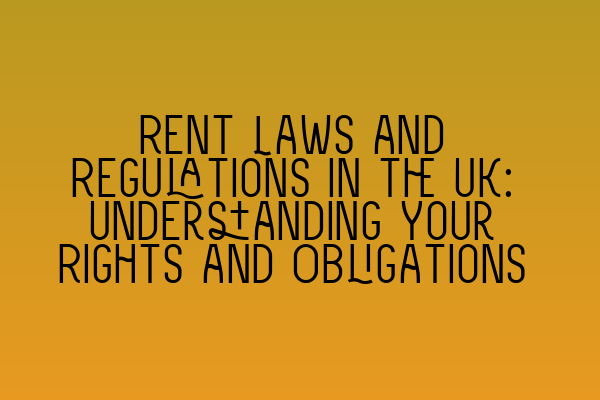Rent Laws and Regulations in the UK: Understanding Your Rights and Obligations
Renting a property is a common practice in the UK, with millions of people opting for this housing option. Whether you are a landlord or a tenant, it is essential to have a thorough understanding of rent laws and regulations to protect your rights and fulfill your obligations. In this article, we will delve into the key aspects of rent laws in the UK, covering topics such as tenancy agreements, rent increases, deposits, and eviction procedures.
Tenancy Agreements: Your Legal Protection
One of the first steps when renting a property is signing a tenancy agreement. This legally binding contract outlines the terms and conditions of the tenancy, serving as a crucial document for both landlords and tenants. As a tenant, it is vital to carefully review the agreement before signing to ensure that your rights and interests are adequately protected.
Misrepresentation in Contracts: Unveiling Deceptive Practices can be a valuable resource to help you understand the common pitfalls to avoid when entering into a tenancy agreement. It highlights the importance of clear and honest communication between parties to prevent any misrepresentation or misunderstanding.
The tenancy agreement should include essential details such as the duration of the tenancy, the amount of rent, payment terms, and any other specific clauses or conditions agreed upon. It is advisable to seek legal advice or consult an experienced solicitor to ensure that the agreement is fair and complies with the relevant laws and regulations.
Rent Increases: Know Your Rights
During the tenancy, landlords may decide to increase the rent. However, they must comply with certain legal requirements and give proper notice to the tenant. The rules regarding rent increases vary depending on the type of tenancy.
If you have an assured shorthold tenancy, your landlord can only increase the rent once the initial fixed term has expired, and they must provide at least one month’s notice (or two months if the rent is paid quarterly). Additionally, the rent increase cannot be excessive, and it must be in line with market rates.
A Closer Look at SQE Contract Law Syllabus explores the syllabus of contract law in detail, offering comprehensive insights into various aspects of contract law, including rent increases.
If you have a regulated tenancy, different rules apply, and rent increases are subject to stricter controls. It is advisable to seek legal advice or consult an experienced solicitor to ensure that your rights are protected and that any rent increase is lawful.
Deposits: Protecting Your Money
When renting a property, it is common for landlords to require a security deposit from tenants. This deposit serves as a form of financial protection for landlords in case of damage to the property or non-payment of rent. However, there are specific regulations in place to protect tenants’ deposits.
In the UK, landlords are legally required to protect tenants’ deposits in a government-approved tenancy deposit scheme. These schemes provide an impartial adjudication service in case of disputes between landlords and tenants. Landlords must also provide tenants with prescribed information regarding the deposit scheme within a certain timeframe.
If the tenancy ends and there are no disputes, landlords must return the deposit to the tenant within a specific timeframe. Failure to comply with deposit protection regulations can result in legal action against the landlord.
SQE Contract Law: Analyzing Landmark Cases and Influential Judicial Decisions offers a comprehensive overview of influential cases and judicial decisions related to contract law. Understanding these cases can provide valuable insights into the legal landscape surrounding deposit protection.
Eviction Procedures: Following the Law
In certain circumstances, landlords may need to evict tenants. However, eviction procedures must follow the legal requirements outlined in the relevant legislation, such as the Housing Act 1988 and the Housing Act 1980.
To evict a tenant legally, landlords must provide a valid notice and obtain a court order. There are different notice periods depending on the type of tenancy and the grounds for eviction. It is crucial for landlords to familiarize themselves with the specific requirements to avoid any legal challenges or delays in the eviction process.
For tenants facing eviction, understanding your rights and available defenses is essential. Seeking legal advice or consulting an experienced solicitor can help you navigate the eviction process effectively and protect your rights as a tenant.
Contract Law for Services: Key Considerations and Best Practices explores various aspects of contract law, including the rights and obligations of both parties involved. This knowledge can be valuable when dealing with eviction procedures and ensuring that all legal requirements are met.
Conclusion
Understanding rent laws and regulations in the UK is crucial for both landlords and tenants. By familiarizing yourself with the intricacies of tenancy agreements, rent increases, deposit protection, and eviction procedures, you can protect your rights and fulfill your obligations.
Remember, seeking legal advice or consulting an experienced solicitor is always recommended to ensure that you are fully compliant with all relevant laws and regulations. By being well-informed and proactive, you can navigate the rental landscape confidently and avoid any potential legal pitfalls.
